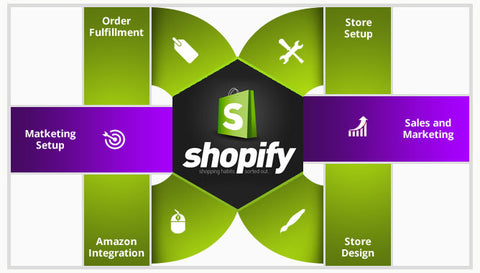Shopify Services By Epoch BG
Shopify Developer Services Provided
Epoch BG Is A Preapproved Registered Shopify Partner


Statistics For Online Stores.
Based on Shopify Stores But Can Be Generally Reflective Of Other Platforms As Well.
90% of new online stores eventually fail. They lack the ability to:
- Drive sales (Drive Traffic, High Bounce Rate, Low Conversion Rates, etc.)
- Keep customers (Bad Product Offering, Bad Pricing / Value, Poorly Designed Site, etc.)
- Provide a good service
The top ten reasons why online startups end in failure:
- Poor online marketing – 37%
- Lack of online search visibility – 35%
- Little to no market for their products or services – 35%
- Running out of cash – 32%
- Price and costing issues – 29%
- Got outcompeted – 23%
- Retail giants dominating a large share of the market – 19%
- Lack customer service – 16%
- Poor team around them – 14%
- Product mistiming – 11%
Typical traits of successful online stores:
- Customer experience above everything
- Brand appeal
- No unnecessary extra costs
- Social proof (testimonials and reviews)
- Accurate product descriptions and specifications
- Top-notch customer service
- Quicker website load speeds
- Abandoned cart recovery
Average conversion rate on non-promotional events is 3-5%.
According to Shopify statistics conversion rates for sales channels are:
- 4.29% for email campaigns
- 3.04% for organic search
- 2.93% direct
- 1.81% social media referrals
- Facebook is unsurprisingly number 1 as a source of social traffic and sales. Almost ⅓ of all social media visits to Shopify stores come from Facebook.
- Facebook has the highest conversion rate among all social media e-commerce traffic – at 1.85%. 85% of orders originating from social media from Facebook traffic.
- On average, email campaigns and general SEO efforts geared for general search engine (Google, Bing, etc.) queries produce the highest conversion rates. Small-budget paid ad campaigns did not fair well.
66% of online sales and over 70% of traffic is now through mobile devices. (Is your store optimized for mobile?)
What Epoch BG resolves setting you up on Shopify:
- Which base Shopify subscription model to chose from and why.
- Which Shopify template to use, setup, and why.
- Setting all Shopify's back-end account settings.
- Setting up SEO and Backlinks.
- Setting product variants properly.
- Optimizing call-to-action and minimizing click-to-cart.
- Setting all the sales channels properly.
- Which Shopify and 3rd party apps to use and why.
- Customize Shopify font and color schemes to match your customer demographics.
- How to tweak the Shopify .liquid files and why.
- When to embed photo/video and when to link photo/video.
- How to become integrated with Amazon FBA.
- Setting up Google Analytics and Webmaster on Google's back-end properly.
- Setting up on Google Merchant Center via Shopify to Enable Google Shopping.
- Setting up Social Media (fb, Pinterest, etc) stores and Social Media Buy Buttons.
Not having the above done in a competent and professional manner will just result in a website that does not generate sales even if it does generate traffic. Most e-commerce sites, whether on Shopify, Squarespace, GoDaddy, etc suffer from this.
And importantly we can provide marketing and advertising services after your Shopify store is up and running.
Contact Us for more information
How Long Does it Take to Develop a Shopify Store?
After you fill out our questionnaire, a basic store can be completed is roughly a half of day. A basic Shopify store is a landing page, about us page, contact us page, Privacy page, Terms of Service page, Returns Page and blog. Google Analytics, Search Console (google webmaster tools) and a google merchant account are all set up. Payment systems are set up. Total time to set up a Shopify store is highly dependent on the number of product SKU's you have and how you want to organize those SKU's.

